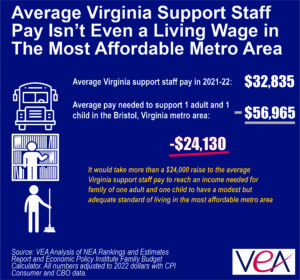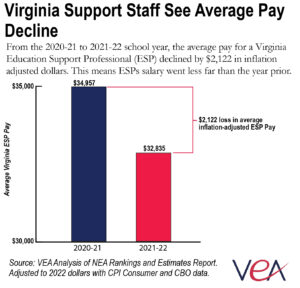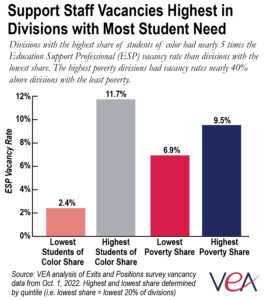Virginia’s Education Support Professionals: Poorly-Paid and in Short Supply
May 30, 2023
May 30, 2023
 There are many gears and cogs that keep the “machine” of public education running smoothly. Many people, even some politicians, rightly recognize teachers for their significant efforts in our schools. But without the bus drivers, teacher’s aides, nurses, clerical and technical workers, lunchroom and janitorial staff who make up the education support professional (ESP) workforce, teachers would not be able to do their jobs. ESPs are an invaluable part of the team ensuring that our kids are safe, fed, healthy, and educated. Yet, all too often, work conditions and pay for ESPs don’t reflect the essential and challenging roles they play in our schools. Today, school operations are being jeopardized due to significant ESP shortages, which in turn directly impact student learning conditions. All Virginia students should have access to healthy and clean school environments, with reliable transportation to and from school, enriching after-school activities, someone to see them when they are not feeling well, and nutritious food options – but unless Virginia lawmakers intervene soon to change course, these necessities won’t be available to all students.
There are many gears and cogs that keep the “machine” of public education running smoothly. Many people, even some politicians, rightly recognize teachers for their significant efforts in our schools. But without the bus drivers, teacher’s aides, nurses, clerical and technical workers, lunchroom and janitorial staff who make up the education support professional (ESP) workforce, teachers would not be able to do their jobs. ESPs are an invaluable part of the team ensuring that our kids are safe, fed, healthy, and educated. Yet, all too often, work conditions and pay for ESPs don’t reflect the essential and challenging roles they play in our schools. Today, school operations are being jeopardized due to significant ESP shortages, which in turn directly impact student learning conditions. All Virginia students should have access to healthy and clean school environments, with reliable transportation to and from school, enriching after-school activities, someone to see them when they are not feeling well, and nutritious food options – but unless Virginia lawmakers intervene soon to change course, these necessities won’t be available to all students.
Like teachers’ salaries, the pay for ESPs has not kept up with inflation; in fact, most ESPs do not even earn a “living wage.” According to the Economic Policy Institute’s family budget calculator, which measures the income required for a family to maintain a modest but adequate standard of living, the average Virginia ESP pay is not sufficient to support a family even in the state’s most affordable metropolitan area.

According to the recent National Education Association’s ESP Earnings Report there are more than 2.25 million ESPs working in K-12 schools nationwide. More than half (57%) have an Associate’s degree or higher. Most (76%) work full time. Yet about 40% of these full-time K-12 professionals earn less than $25,000 per year, and 13% earn less than $15,000. Many ESPs report having to take second or third jobs to make ends meet. Some of these staff are making less per hour than students who work after school at fast food restaurants.
More than 25% of ESPs reported utilizing federal assistance programs. Seven percent are using free grocery or meal programs, 7% qualify for Medicaid, and 4% report using SNAP benefits. These professionals are held to high standards, but are not paid a living wage.
Average pay for full-time ESPs in Virginia has declined under Governor Youngkin in real terms; the miniscule 0.2% increase in average pay (from $32,755 in 20-21 to $32,835 in 21-22) evaporates when adjusted for inflation, leaving these essential employees with a $2,122 (6%) loss in purchasing power.
 Painful ESP staffing shortages exist in every region of the state. While the statewide average teacher vacancy rate now stands at 4%, the support staff vacancy rate is nearly double that. In school divisions with the highest share of students living in poverty or students of color, the ESP vacancy rates are significantly higher than the average. These uneven support staff shortages mean that Virginia students who face the most barriers to learning are also the ones least likely to attend schools with an adequate number of support staff.
Painful ESP staffing shortages exist in every region of the state. While the statewide average teacher vacancy rate now stands at 4%, the support staff vacancy rate is nearly double that. In school divisions with the highest share of students living in poverty or students of color, the ESP vacancy rates are significantly higher than the average. These uneven support staff shortages mean that Virginia students who face the most barriers to learning are also the ones least likely to attend schools with an adequate number of support staff.
Many ESPs are also potential teachers. Most ESPs work with licensed teachers daily, and have a firsthand view of how rewarding and impactful the teaching profession can be. Some ESPs have decades of experience instructing students as classroom aides or implementing behavioral management and relationship-building exercises on buses or in cafeterias. They could make a measurable dent in the teacher shortage crisis facing our state if more pathways were available to support them entering into a teacher licensure program. Virginia is behind other states in ramping up state-supported teacher residency and grow-your-own models to becoming a teacher – we currently invest in only a handful of small scale programs like those at certain state universities.
Our political leaders, instead of focusing on culture wars in schools, should be making a real impact in the lives of Virginia’s children and families by ensuring that all school employees are paid competitive wages to attract the best and brightest – especially in our highest need schools. State lawmakers are set to finalize the state budget in late June and hopefully will follow through on providing an additional 2% state raise on top of the 5% they already promised for next year for all state-supported school employees. Yet, we know this still won’t be enough and likely won’t even get us to inflation-adjusted pre-pandemic levels of pay for our ESPs. We need bold leadership at the state and local levels to start paying all school support staff not just a living wage, but a thriving wage so that we can keep these experienced and qualified ESPs in our schools.
According to the Economic Policy Institute, teachers in Virginia earn 67 cents on the dollar compared to other (non-teacher) college-educated workers. Virginia’s teacher wage penalty is the worst in the nation.
Learn More